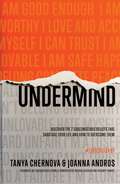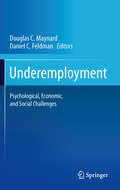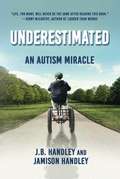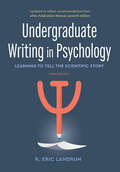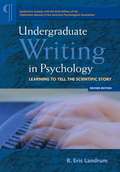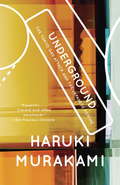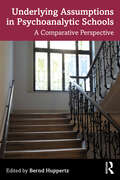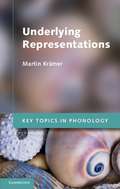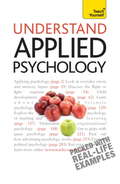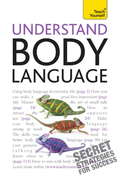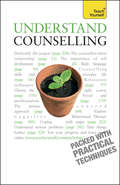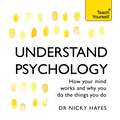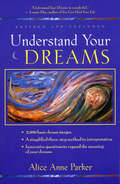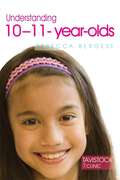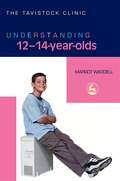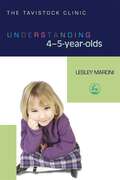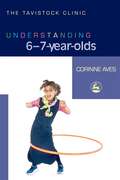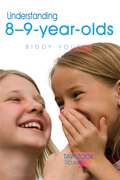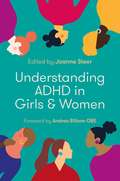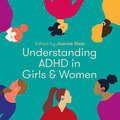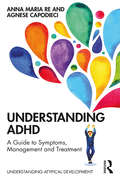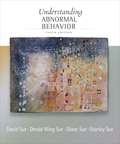- Table View
- List View
UnderMind: Discover the 7 Subconscious Beliefs that Sabotage Your Life and How to Overcome Them
by Tanya Chernova Joanna AndrosThis #1 bestselling book is for everyone who has ever wanted to be successful in any area of life, but is left wondering why they simply can&’t attain it.Seven destructive beliefs are quietly living and breathing in the subconscious minds of billions of people. They are the pillars of a corrupt unconscious belief system that sabotages success, and because of them bank accounts dwindle, self-esteem suffers, relationships fail, health falters, and inner peace is always out of reach. When you understand which of the seven beliefs are operating in your own life, you will see how they have affected your past and how they will control your future – if you let them. Through methodically designed exercises, UnderMind provides you with a revealing evaluation of what your subconscious mind is programmed to achieve or sabotage. The life-changing results of these exercises tell you why you&’ve made achievements in certain areas, while you&’ve floundered on others. With UnderMind&’s groundbreaking methods for revelation and reprogramming, self sabotaging beliefs that have existed for decades can be dissolved in only hours. Financial abundance, self-love, meaningful relationships, health, fulfillment and more are possible when you take control of your subconscious and stop living UnderMind. Gain the effortless power to accomplish anything! This book is for everyone who has ever wanted to be successful in any area of life, but is left wondering why they simply can&’t attain it.
Underemployment
by Daniel C. Feldman Douglas C. MaynardUnderemployment - when people are employed in some way that is insufficient, such as being overqualified or working part-time when one desires full-time employment - is a challenge faced by all industrialized nations and their organizations and individuals. Just like unemployment, some level of underemployment exists even in the best of times, but it becomes more pervasive when the job market is weak. Given the current economic climate in North America and abroad, researchers and scholars in various disciplines (psychology, business, sociology, economics) are becoming more interested in investigating the effects of underemployment and identifying possible practical solutions. Underemployment synthesizes the current understanding of the phenomenon by bringing together scholars with diverse perspectives and expertise with the aim of informing and guiding the next generation of underemployment research.
Underestimated: An Autism Miracle (Children’s Health Defense)
by J. B. Handley Jamison HandleyThe incredibly moving and inspiring story about a quest to finally be heard.In Underestimated: An Autism Miracle, Generation Rescue&’s cofounder J.B. Handley and his teenage son Jamison tell the remarkable story of Jamison&’s journey to find a method of communication that allowed him to show the world that he was a brilliant, wise, generous, and complex individual who had been misunderstood and underestimated by everyone in his life. Jamison&’s emergence at the age of seventeen from his self-described &“prison of silence&” took place over a profoundly emotional and dramatic twelve-month period that is retold from his father&’s perspective. The book reads like a spy thriller while allowing the reader to share in the complex emotions of both exhilaration and anguish that accompany Jamison&’s journey for him and his family. Once Jamison&’s extraordinary story has been told, Jamison takes over the narrative to share the story from his perspective, allowing the world to hear from someone who many had dismissed and cast aside as incapable.Jamison&’s remarkable transformation challenges the conventional wisdom surrounding autism, a disability impacting 1 in 36 Americans. Many scientists still consider nonspeakers with autism—a full 40 percent of those on the autism spectrum—to be &“mentally retarded.&” Is it possible that the experts are wrong about several million people? Are all the nonspeakers like Jamison? Underestimated: An Autism Miracle will touch your heart, inspire you, remind you of the power of love, and ultimately leave you asking tough questions about how many more Jamisons might be waiting for their chance to be freed from their prison of silence, too. And, for the millions of parents of children with autism, the book offers a detailed description of a communication method that may give millions of people with autism back their voice.
Undergraduate Writing in Psychology: Learning to Tell the Scientific Story
by R. Eric LandrumThis third edition features new writing samples, including a full-length literature review and full-length scientific research paper, and new guidance to reflect the seventh edition of the Publication Manual of the American Psychological Association. This accessible, practical guide to undergraduate writing takes the reader step by step through the process of developing research questions or theses, conducting literature searches, analyzing and synthesizing the literature, writing the paper, and more. Students will learn how to analyze and organize ideas for literature reviews, as well as how to prepare each section of a scientific research paper (introduction, method, results, discussion). This updated edition is full of: advice and resources, including a checklist and self-quiz; a sample grading rubric that an instructor might use; example reference formats; and several before-and-after writing samples showing marked-up changes. Bonus guidance is given for communicating effectively with instructors and preparing conference posters.
Undergraduate Writing in Psychology: Learning to tell the Scientific Story, Revised Edition
by R. Eric LandrumNow updated to reflect the changes made from the 5th to the 6th edition of the Publication Manual, this book takes the reader step-by-step through: crafting research questions or theses; executing library database searches; analyzing, evaluating, and synthesizing literature; drafting specific parts of a paper; and more.
Underground: The Tokyo Gas Attack and the Japanese Psyche (Vintage International)
by Haruki MurakamiIn this haunting work of journalistic investigation, Haruki Murakami tells the story of the horrific terrorist attack on Japanese soil that shook the entire world. On a clear spring day in 1995, five members of a religious cult unleashed poison gas on the Tokyo subway system. In attempt to discover why, Haruki Murakmi talks to the people who lived through the catastrophe, and in so doing lays bare the Japanese psyche. As he discerns the fundamental issues that led to the attack, Murakami paints a clear vision of an event that could occur anytime, anywhere.
Underlying Assumptions in Psychoanalytic Schools: A Comparative Perspective
by Bernd HuppertzThis book offers a comparative study of the major schools of psychoanalysis by exploring their historical development, their differences and similarities, and the underlying assumptions made by each. Encompassing the expertise of colleagues from different schools of psychoanalytic thought, each chapter explores a particular perspective, defining specific theoretical assumptions, theories of etiology, and implications for technique, as well as providing each author’s view on the historical development of key psychoanalytic concepts. With contributions from leading authors in the field, and covering both historical and international schools, the book provides an enlightening account that will prove essential to psychoanalytic practitioners and students of psychoanalysis and the history of medicine.
Underlying Representations
by Martin KrämerAt the heart of generative phonology lies the assumption that the sounds of every language have abstract underlying representations, which undergo various changes in order to generate the 'surface' representations, that is, the sounds we actually pronounce. The existence, status and form of underlying representations have been hotly debated in phonological research since the introduction of the phoneme in the nineteenth century. This book provides a comprehensive overview of theories of the mental representation of the sounds of language. How does the mind store and process phonological representations? Krämer surveys the development of the concept of underlying representation over the last 100 years or so within the field of generative phonology. He considers phonological patterns, psycho-linguistic experiments, statistical generalisations over data corpora and phenomena such as hypercorrection. The book offers a new understanding of contrastive features and proposes a modification of the optimality-theoretic approach to the generation of underlying representations.
Understand Applied Psychology: Teach Yourself (TY Social Science)
by Nicky HayesUnderstand Applied Psychology shows how basic psychological processes are relevant to everyday situations and contexts. From education to occupational psychology, this book provides a comprehensive look at psychology in almost every area of day-to-day living. It covers 18 different areas of applied psychology, explaining how psychologists work in the community as a whole and how psychology is applied to working life and broader aspects of living. The book also includes well-developed but unknown areas such as space psychology and eco-psychology, showing the scope of applied psychology and giving ideas for other areas where it could usefully contribute to our everyday lives. NOT GOT MUCH TIME? One, five and ten-minute introductions to key principles to get you started. AUTHOR INSIGHTS Lots of instant help with common problems and quick tips for success, based on the author's many years of experience. TEST YOURSELF Tests in the book and online to keep track of your progress. EXTEND YOUR KNOWLEDGE Extra online articles at www.teachyourself.com to give you a richer understanding of applied psychology. FIVE THINGS TO REMEMBER Quick refreshers to help you remember the key facts. TRY THIS Innovative exercises illustrate what you've learnt and how to use it.
Understand Applied Psychology: Teach Yourself (Ty Social Science Ser.)
by Nicky HayesUnderstand Applied Psychology shows how basic psychological processes are relevant to everyday situations and contexts. From education to occupational psychology, this book provides a comprehensive look at psychology in almost every area of day-to-day living. It covers 18 different areas of applied psychology, explaining how psychologists work in the community as a whole and how psychology is applied to working life and broader aspects of living. The book also includes well-developed but unknown areas such as space psychology and eco-psychology, showing the scope of applied psychology and giving ideas for other areas where it could usefully contribute to our everyday lives.NOT GOT MUCH TIME?One, five and ten-minute introductions to key principles to get you started.AUTHOR INSIGHTSLots of instant help with common problems and quick tips for success, based on the author's many years of experience.TEST YOURSELFTests in the book and online to keep track of your progress.EXTEND YOUR KNOWLEDGEExtra online articles at www.teachyourself.com to give you a richer understanding of applied psychology.FIVE THINGS TO REMEMBERQuick refreshers to help you remember the key facts.TRY THISInnovative exercises illustrate what you've learnt and how to use it.
Understand Body Language: Teach Yourself
by Gordon WainwrightTeach Yourself - the world's leading learning brand - is relaunched in 2010 as a multi-platform experience that will keep you motivated to achieve your goals. Let our expert author guide you through this brand new edition, with personal insights, tips, energising self-tests and summaries throughout the book. Go online at www.teachyourself.com for tests, extension articles and a vibrant community of like-minded learners. And if you don't have much time, don't worry - every book gives you 1, 5 and 10-minute bites of learning to get you started. - A bestseller, now fully updated with the very latest on body language and non-verbal communication - The only title to give you practical exercises to help you understand your own and other peoples' body language - Unlike other titles, this is not restricted to the workplace but shows you how to understand what other people are saying in every social and domestic situation - Includes the very latest on NLP and how to communicate more effectively through its useWe all use body language. Over 90% of all face-to-face communication is non-verbal, and the silent messages of body language often reveal more than the spoken word in conveying true feelings. These messages are particularly significant in influencing first impressions and the self-image we project to others.Now updated for the 21st century with the very latest on NLP and other cutting edge research, Teach Yourself Body Language gives you the knowledge and understanding to be able to use and interpret body language more effectively. It includes practical exercises that will enhance your understanding of non-verbal communication, and it also explores the use of body language in personal and professional situations.All aspects of body language are covered including features of the workplace and features exhibited in an international context.
Understand Body Language: Teach Yourself (Teach Yourself General)
by Gordon WainwrightTeach Yourself - the world's leading learning brand - is relaunched in 2010 as a multi-platform experience that will keep you motivated to achieve your goals. Let our expert author guide you through this brand new edition, with personal insights, tips, energising self-tests and summaries throughout the book. Go online at www.teachyourself.com for tests, extension articles and a vibrant community of like-minded learners. And if you don't have much time, don't worry - every book gives you 1, 5 and 10-minute bites of learning to get you started. - A bestseller, now fully updated with the very latest on body language and non-verbal communication - The only title to give you practical exercises to help you understand your own and other peoples' body language - Unlike other titles, this is not restricted to the workplace but shows you how to understand what other people are saying in every social and domestic situation - Includes the very latest on NLP and how to communicate more effectively through its useWe all use body language. Over 90% of all face-to-face communication is non-verbal, and the silent messages of body language often reveal more than the spoken word in conveying true feelings. These messages are particularly significant in influencing first impressions and the self-image we project to others.Now updated for the 21st century with the very latest on NLP and other cutting edge research, Teach Yourself Body Language gives you the knowledge and understanding to be able to use and interpret body language more effectively. It includes practical exercises that will enhance your understanding of non-verbal communication, and it also explores the use of body language in personal and professional situations.All aspects of body language are covered including features of the workplace and features exhibited in an international context.
Understand Counselling: Learn Counselling Skills For Any Situations
by Aileen MilneUnderstand Counselling will give you a clear understanding of the main counselling theories and help you develop vital counselling skills. It will introduce you to the three main branches of counselling - psychodynamic therapy, person-centred therapy and cognitive behavioural therapy - and familiarize you with the key features of each one. Whether you are interested in training as a counsellor, are considering counselling yourself or simply want to become a better communicator, this book will give you confidence and understanding.NOT GOT MUCH TIME?One, five and ten-minute introductions to key principles to get you started.AUTHOR INSIGHTSLots of instant help with common problems and quick tips for success, based on the author's many years of experience.TEST YOURSELFTests in the book and online to keep track of your progress.EXTEND YOUR KNOWLEDGEExtra online articles at www.teachyourself.com to give you a richer understanding of counselling.FIVE THINGS TO REMEMBERQuick refreshers to help you remember the key facts.TRY THISInnovative exercises illustrate what you've learnt and how to use it.
Understand Counselling: Learn Counselling Skills For Any Situations (Teach Yourself Educational Ser.)
by Aileen MilneUnderstand Counselling will give you a clear understanding of the main counselling theories and help you develop vital counselling skills. It will introduce you to the three main branches of counselling - psychodynamic therapy, person-centred therapy and cognitive behavioural therapy - and familiarize you with the key features of each one. Whether you are interested in training as a counsellor, are considering counselling yourself or simply want to become a better communicator, this book will give you confidence and understanding.NOT GOT MUCH TIME?One, five and ten-minute introductions to key principles to get you started.AUTHOR INSIGHTSLots of instant help with common problems and quick tips for success, based on the author's many years of experience.TEST YOURSELFTests in the book and online to keep track of your progress.EXTEND YOUR KNOWLEDGEExtra online articles at www.teachyourself.com to give you a richer understanding of counselling.FIVE THINGS TO REMEMBERQuick refreshers to help you remember the key facts.TRY THISInnovative exercises illustrate what you've learnt and how to use it.
Understand Psychology: Teach Yourself (Teach Yourself)
by Nicky HayesA FASCINATING INSIGHT INTO WHAT MAKES US TICKThe bestselling Understand Psychology explains basic psychological processes and how they influence us in all aspects of everyday life. It explores why we are the way we are, how we came to be that way, and what we might do to change seemingly fundamental traits. The book puts psychology in context, using non-technical language to analyze everyday situations. It is a comprehensive introduction that shows how human experience can be understood on many levels.Understand Psychology takes you through every aspect of the subject, from child development and social influences to the role of memories and emotions. You will discover how we interact with each other, why we dream, what motivates us, why children need to play and whether watching TV is bad for you.Now fully revised and updated, this 6th edition of the bestselling guide includes brand new material on mindfulness, social living, focusing in particular on shyness and loneliness and social media, coping with stress, decision making and forensic psychology, addiction and modern drugs, cognitive neuropsychology, and the psychology of learning, including teaching, exams and exam stress.The clear structure, packed full of practical examples, makes it easy to learn the essentials you really need to know.ABOUT THE SERIESPeople have been learning with Teach Yourself since 1938. With a vast range of practical, how-to guides covering language learning, lifestyle, hobbies, business, psychology and self-help, there's a Teach Yourself book for whatever you want to do. Join more than 60 million people who have reached their goals with Teach Yourself, and never stop learning.
Understand Your Dreams
by Alice Anne ParkerThis revised and updated edition of a classic book on dream interpretation includes 500 more images and a new three-step process for understanding the messages of your subconscious mind. Divided into four sections, Understand Your Dreams includes: an introduction to dreams with directions for using the book, a short-cut method of interpreting your dreams, a longer eight-step method for deeper interpretation, and a glossary with more than 2000 images from A to Z. In the vocabulary section, each entry includes common associations for the image and questions to ask yourself to understand the image in the context of your own life and dream. For example, the association for "zombie" is "living death" and the question is "What am I afraid to let go of?" For "scissors": "feminine weapon; separation" and "What do I wish to cut out?" The format is inviting and interesting reading, and, based on the letters the author receives, the work has proven to be useful for thousands of readers for the past 10 years. What makes Understand Your Dreams unique? Alice Anne Parker has developed a proven technique to recall and record dreams while they are still fresh in the dreamer's mind by grouping similar images, feelings, and characters into affinity circles. By pinpointing the feelings and images of dreams and identifying them with the dreamer's waking life, readers gain insights into their own subconscious. The extensive dream dictionary shows how dream images trigger pivotal questions that stimulate ideas and associations in the reader -- something that mere definitions cannot. Parker goes on to guide the reader into developing a personal dream vocabulary and explains how to work with a partner or lover to cultivate "active dreaming."
Understanding 10-11-Year-Olds
by Jonathan Bradley Rebecca BergeseUnderstanding 10-11-Year-Olds introduces the challenges that face children as they start to make their transition from childhood into adolescence. Children at this age begin to express independence and confidence in their capability that may extend beyond their direct experience. Adults caring for their well-being need to monitor the new dimensions in the child's life, such as competitiveness and its impact on relationships at school and at home. Rebecca Bergese guides the reader through the broad range of emotional and social challenges experienced by children as they are encouraged to take on greater responsibility. This book is essential reading for parents, carers and professionals who are seeking to understand and support a child at this vulnerable stage of development.
Understanding 12-14-Year-Olds
by Margot Waddell Jonathan BradleyHow much independence should parents allow teenagers who claim rights and privileges, show excessive confidence and test the boundaries of discipline? How can parents handle the physical and emotional changes in their adolescent child? This book offers helpful advice to parents whose children have reached the turbulent teenage years. From conflict management to issues of bullying, stealing and smoking, it guides parents as their children alternate between maturity and immaturity and develop their own identity. It explains the impact of school life, group pressures and close friendships on 12-14-year-olds' development and helps parents to offer their child support, while accepting his or her increased need for privacy. Alongside these challenges, the author reveals the rewards of sharing in these young people's enthusiasm and ambitions, as they grow more confident and responsible. This book provides practical and sensitive advice for parents to help them relate to and communicate with their child at a difficult time of transition, while being prepared to question what they thought they already knew about their son or daughter - and about parenting.
Understanding 4-5-Year-Olds
by Jonathan Bradley Lesley MaroniUnderstanding 4-5-year-olds gives a thoughtful overview of the challenges that children face as they gradually move away from a strong attachment to their families and turn towards the wider world of school and life outside the family. Lesley Maroni discusses the critical social and emotional developments at this age, including identity, independence and sibling rivalry, the transition to school and friendships with peers, coping with illness and loss, and gender differences. The author also shows how 4-5-year-olds explore real issues using the protective safety of pretend play and their imagination. This accessible book provides valuable insights and a wealth of case examples that will help parents, educators and carers better understand and relate to children at this demanding, yet exciting, stage of development.
Understanding 6-7-Year-Olds
by Jonathan Bradley Corinne AvesWhat challenges do 6-7-year-olds face as they learn new skills and face different social situations? How do their perceptions of the world change? How can we best support them in their move towards greater independence? This accessible book provides a wealth of information to help parents, educators and carers better relate to children at this exciting, yet demanding, stage of development. From the new-found sense of rivalry between siblings or classmates, to the anxieties children feel when making new friends, Corinne Aves offers guidance on encouraging children's development and helping them to cope with changing expectations of their behaviour. She discusses the various struggles in these children's lives – such as the conflict between a child's continuing desire to please his parents and the pressure to follow the leads of his friends – and gives tips for supporting children's increasing understanding of morality. Chapters on both school and family life explain the need for discipline and order in 'middle childhood', while specific areas of development such as reading skills and learning difficulties are addressed with sensitivity and insight. Understanding 6-7-Year-Olds will prove an enlightening read for anyone hoping to better understand children at this important stage of their lives.
Understanding 8-9-Year-Olds
by Jonathan Bradley Biddy YouellUnderstanding 8-9-Year-Olds describes how children grow and change as they move further away from reliance on home and family, out into the world of school and community. Children of this age develop preferences as well as opinions based on their experience of new relationships and activities. For many children, it is a period of relative calm as they develop through new skills while accumulating knowledge. Biddy Youell looks at the ways in which eight and nine year olds experience their world and highlights some of the difficulties that may hinder their emotional, social or educational development. This accessible book provides valuable insights that will help parents, educators and carers better understand and relate to children during these middle years of childhood.
Understanding ADHD in Girls and Women
by Peter Hill Sally Cubbin Claire Berry Jess Brunet Alex Doig Eva Akins Valerie Ivens Allyson ParryWritten by expert professionals, this book provides comprehensive information about available support for women and girls with ADHD and tips for clinicians and professionals who work with them.The symptoms of ADHD are no less impairing in females than males, but can be missed or misunderstood. This book arms professionals, parents, and women themselves as it maps out where to go for information, who can help and how to understand ADHD better. It explains routes to assessment and diagnosis for girls and young women, how to access support in education, available treatments, and the impact of living with ADHD on overall mental health. It explores the benefits of ADHD coaching for girls to help develop their unique strengths and talents. There is also a focus on ADHD diagnosis for women in adulthood and specific advice about treatment and medication for later in life. Central to the book are the personal experiences of ADHD from women and girls from a variety of backgrounds. These tell of late diagnosis, missed opportunities, a lifetime of adaptations and the power of recognition and treatment and are powerful stories for professionals and individuals with ADHD alike.
Understanding ADHD in Girls and Women
by Peter Hill Sally Cubbin Claire Berry Jess Brunet Alex Doig Eva Akins Valerie Ivens Allyson ParryInsights and best practice for professionals on ADHD in girls and women. Written by expert professionals, this book provides comprehensive information about available support for women and girls with ADHD and tips for clinicians and professionals who work with them.The symptoms of ADHD are no less impairing in females than males, but can be missed or misunderstood. This book arms professionals, parents, and women themselves as it maps out where to go for information, who can help and how to understand ADHD better. It explains routes to assessment and diagnosis for girls and young women, how to access support in education, available treatments, and the impact of living with ADHD on overall mental health. It explores the benefits of ADHD coaching for girls to help develop their unique strengths and talents. There is also a focus on ADHD diagnosis for women in adulthood and specific advice about treatment and medication for later in life. Central to the book are the personal experiences of ADHD from women and girls from a variety of backgrounds. These tell of late diagnosis, missed opportunities, a lifetime of adaptations and the power of recognition and treatment and are powerful stories for professionals and individuals with ADHD alike.(P) 2021 Hodder & Stoughton Ltd
Understanding ADHD: A Guide to Symptoms, Management and Treatment (Understanding Atypical Development)
by Anna Maria Re Agnese CapodieciThis essential guide provides accessible, concise, evidence-based guidelines on Atttention Deficit Hyperactivity Disorder (ADHD), offering a deeper scientific understanding of the condition and its consequences. It offers ideas and insights for managing the condition in daily family life and promoting the most effective self-regulation strategies for children and adolescents, allowing parents to better understand the origins of their child’s behaviour and avoid potential negative consequences. In this straightforward text, Capodieci and Re set out the basic theories on ADHD and cover key topics including parent-child relationships, helping children understand their condition, friendships with peers, comorbidities, classroom strategies, and how families and professionals can best work together. Taking into account the most recent updates to the DSM-5 definition of ADHD, the authors emphasise the importance of a multifocal approach to the treatment of ADHD, involving the child’s teachers, parents and peers, to better develop family and peer relationships. They offer strategies for the classroom, for good sleep and for healthy eating and physical activity, and support for any other learning, language, movement and emotional problems an ADHD child might have. Understanding ADHD will be essential reading for parents of children with ADHD, as well as health, education and social care professionals involved in the field.
Understanding Abnormal Behavior
by David Sue Stanley Sue Derald Sue Diane SueFeaturing current research, high-quality scholarship, and an appealing design, UNDERSTANDING ABNORMAL BEHAVIOR, 10th Edition, provides an inviting and stimulating look into abnormal psychology. The first abnormal psychology book to present a thoroughly integrated multicultural perspective -- based on the authors' view that cross-cultural comparisons can greatly enhance the understanding of disorders -- the text provides extensive coverage and integration of multicultural models, explanations, and concepts. It also continues the multipath model introduced in the 9th edition, emphasizing the importance of considering biological, psychological, social, and sociocultural factors, as well as their interactions in the etiology of mental disorders. The book helps you gain an understanding of abnormal behavior as scientific and clinical endeavors, while providing insight into the tools that mental health professionals use to study and treat disorders. It also begins to discuss the proposed changes in the APA's DSM-5 definition of mental disorders and its implications, including its change of focus from a categorical to a dimensional system of personality assessment.
